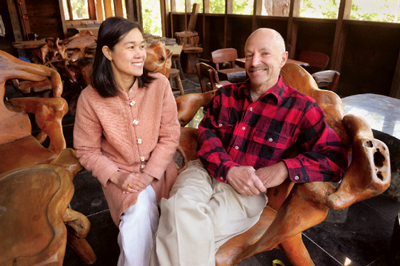To say that David Lee Hoffman is passionate about tea is an understatement. For Hoffman, tea is much more than a calming drink to sip on a cold afternoon. Tea is Hoffman’s life.
For two decades Hoffman has devoted himself to tea, journeying around the world in search of the finest leaves to share with others. His devotion was the subject of All in This Tea, filmmaker Les Blank’s 2007 documentary about Hoffman’s tea-seeking trips throughout China.
Hoffman, 63, ventured to some of that country’s remotest regions, often on foot, in search of handcrafted tea leaves. He sought tea to drink in its purest form—no tea bags, no flavorings, no cream or sugar. Nothing more than the best leaves steeped in hot water, their taste complex but decidedly pleasurable.
“It’s so easy to become distracted by all the complexities in life and for me tea symbolizes the opposite,” he says. “It symbolizes the simplicity of life.”
Like most Americans, Hoffman once knew little about tea. During a break from his college studies, he traveled the globe, eventually landing in Asia and drinking various local teas. After returning to his eclectic hillside home in Lagunitas, where he lives with his wife and business partner, Bee Ratchanee Chaikamwung, he searched unsuccessfully for that same authentic taste, visiting the Chinatowns of San Francisco and Vancouver.
Hoffman saw only one solution: go directly to the source. He began seeking out Chinese farmers who grew premium tea leaves without pesticides. Such an approach was unheard of in China at the time, especially from a foreigner. Yet Hoffman’s perseverance and increasingly large purchases helped spread his reputation across China.
“He’ll taste all the teas, learns all the methods of processing tea, of serving tea, [and] he becomes an expert,” says Blank, who coproduced and codirected All in This Tea with Gina Leibrecht. “And he does it in such a way that people are glad to provide him with answers because of his interest and enthusiasm.”
Hoffman attended tea tastings with Chinese government officials, appeared on television and was eagerly sought after by local tea merchants during his visits. He was often in their country four months out of the year.
Back home, word spread about Hoffman’s premium leaves and he found himself doing $1 million in sales out of his garage. He formed a company but, not interested in being a businessman, he eventually sold it. “I simply wanted to find tea and bring it back here,” he says.
Hoffman now visits Asia about once a year and focuses primarily on undiscovered rare teas in Burma and Thailand. He’s aging more than 300 different types of Pu-ehr tea (named after a county in southwest China) on his property in underground caves. He hopes to turn those raw leaves into finished tea by constructing a production facility there as well.
A tea house he’s building for appointment-only tastings will impart such fine points to visitors as the origin of each leaf, the nuances of its flavor and the recommended way to steep it. Yet he’s not aiming to force-feed his expertise — only to reveal the pleasures of a good cup of tea and the conversations it may inspire.
“People are always asking me… how to make a good cup of tea and I always tell them one thing: there are no rules for making tea,” he says. “Do whatever you want and trust your own palate. There are no right or wrong answers for tea.”


